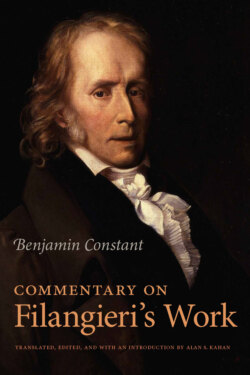Читать книгу Commentary on Filangieri’s Work - Benjamin de Constant - Страница 8
На сайте Литреса книга снята с продажи.
Оглавление[print edition page xvii]
Translator’s Note
As the translator of Benjamin Constant’s Commentary on Filangieri’s Work I have, like Dennis O’Keeffe in his Liberty Fund translation of Constant’s Principles of Politics, striven to “retain as much as possible of the general elegance and subtle rhetoric of Constant’s writing while seeking to render it in accurate, graceful, and accessible English.”1 This has meant breaking up some of Constant’s very long sentences, and lengthening some of his very brief paragraphs by annexing them to preceding or following ones where appropriate. As conventions change across times and languages, translations must change with them. The intention has always been to give the English reader of the twenty-first century the same ease and comfort that the French reader of the nineteenth century experienced when reading Constant. However, it must be admitted that in Constant’s Commentary on Filangieri’s Work the quality of the writing is very variable. Constant could write with elegance and subtlety when he wished, but he did not always take the trouble to do so. Nevertheless, for the most part even when Constant is not elegant, his meaning is clear, and the task of the translator is in this sense a straightforward one.
In certain respects, however, any translator of eighteenth- or nineteenth-century French social thought has to make choices that are less than straightforward. It is only proper to give the reader fair warning of how some of the most important of these choices have been made. For the word liberté, which presents the translator with the alternatives of “liberty” and “freedom,” I have generally chosen freedom, on the grounds that liberty has an increasingly archaic or historical ring to readers today. The French terms lumières, pouvoir,
[print edition page xviii]
and autorité have been translated into the appropriate English words—words plural, rather than singular, because the meanings Constant wished to convey by those terms varies and depends on context. Thus while Constant most often used pouvoir and autorité as synonyms for “government,” he sometimes used them in a more abstract sense. In those cases they have been translated accordingly, as “power” or “authority.” Lumières has been translated as “education,” “knowledge,” and more rarely “enlightenment,” depending on context. To those who argue that a word has only one meaning for a given author, I can only reply that this sort of consistency, if it is ever to be found in any writer, is not present in Constant’s writings.
Whether the result of these choices has succeeded in producing an English-language text that is faithful to Constant as well as to both the French and English languages is a decision that must be made by the reader. In making my choices I have been greatly aided by my editor at Liberty Fund, Christine Henderson, and by the reader for the project, Jeremy Jennings. To both of them go my thanks for their help. All remaining inaccuracies and needless infelicities of style are the responsibility of the translator alone.
